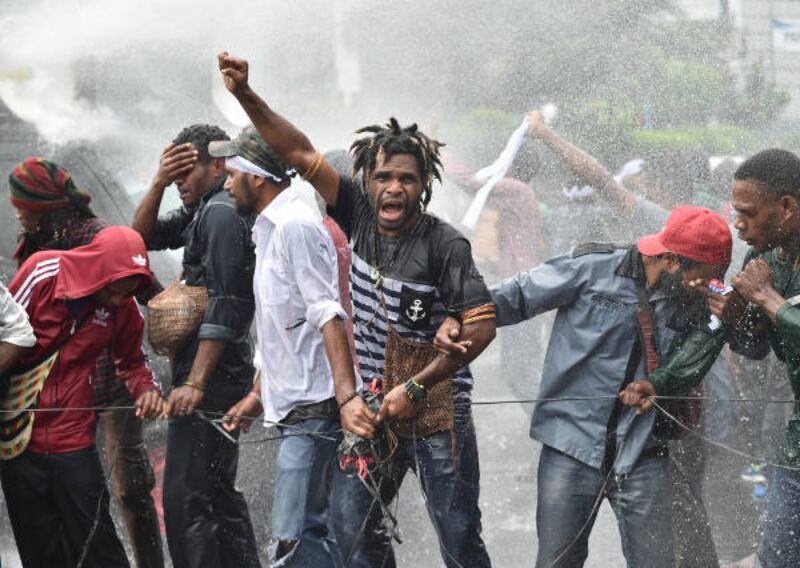Papuan students and activists held small-scale demonstrations in several Indonesian cities Thursday to mark the 55th anniversary of what they consider their aborted independence day.
Hundreds of people gathered in Jayapura, the capital of Papua province, for speeches and prayers, and later signed a huge banner to support the United Liberation Movement for West Papua, an umbrella organization of pro-independence groups.
Speakers at the event included Filep Karma, who was released from prison in 2015 after serving 11 years for raising the so-called Morning Star flag in 2004. Thursday’s gathering did not include the flying of the flag, nor did the participants appear to have one.
“Papuans are already aware and do not want to be provoked by violence and conflict. Prayers and speeches such as these show political maturity and a dignified struggle,” Karma said.
In Wamena, a town in the Papuan highlands, speeches and prayers were held from midday to 4:00 p.m. at the La Pago Traditional Council office. Engelbert Surabut, who was in charge of the event, claimed that 3,000 people attended the peaceful gathering.
“Two police cars came. We coordinated it before hand,” he told BenarNews.
“We had agreed with the police, they only watched from the outside. We are thankful to the Indonesian government who via the police gave us this opportunity to worship,” he said.
Arrests in Jakarta
Small demonstrations took place in other parts of Indonesia. Hundreds of students and activists from Papua gathered in front of the Legal Aid Institute (LBH) in Jakarta early Thursday, then began a march to the Hotel Indonesia circle.
Tense moments ensued on Imam Bonjol Street when dozens of police used shields to block the singing and chanting marchers, and the marchers then pulled out headbands bearing the morning star flag symbol, CNN Indonesia reported.
Police then shot water canons at the demonstrators and eventually arrested all of them.
“They were apprehended because they carried Morning Star paraphernalia. We confiscated them because they are not this nation’s emblem,” Jakarta police official Hendy F Kurniawan told the Jakarta Post.
“All participants in the action, about 150 people, were arrested and transported to Jakarta Metro Police,” Veronica Koman, a lawyer with LBH, told BenarNews.
“In Yogyakarta, reportedly eight people were arrested. We haven’t yet checked in Ternate, where there was also a demonstration,” she said, referring to a city in the Maluku islands of eastern Indonesia.

Papuan demonstrators react to water cannon fired at them by police in Jakarta, Dec. 1, 2016. [AFP]
Self-determination?
On November 29, a group in Jakarta calling itself the Indonesian People’s Front for West Papua (FRI West Papua) declared support for a Papuan self-determination referendum.
Surya Anta, a spokesman for FRI West Papua, said the group was formed out of awareness of what he termed the deceitful integration of Papua into Indonesia.
“West Papua was a colonial territory without a government acknowledged by the United Nations and Dtuch colonists in 1949. That status won’t change until there is self-determination,” he told BenarNews.
Octavianus Mote, secretary general of ULMWP, welcomed the statement, saying it showed that some Indonesians “are starting to acknowledge that crimes have been committed by the government and military of Indonesia in Papua.”
The provinces of Papua and West Papua, located at the eastern end of the Indonesian archipelago, make up one-fifth of Indonesia’s land mass. Only 5.9 million of Indonesia’s 250 million people live there.
Migrants from other parts of Indonesia now make up about half the population and dominate commercial activity, according to reports. Indigenous Papuans are ethnically Melanesian and many of them are Christians.
In 1961, the region was a Dutch territory undergoing a decolonization process with the goal of full independence in 1970. Papuans had already commissioned a national anthem and flag, which was flown for the first time on Dec. 1, 1961.
Indonesia, under then-president Soekarno, viewed all former Dutch possessions in the region as rightful parts of Indonesia, and began a military campaign to “liberate” what was then known as West Irian.
Amid escalating tensions, the Dutch abandoned the region and in May 1963, via the United Nations, West Irian was transferred to Indonesia. Some 1,025 Papuans who participated under Indonesian military supervision in a U.N.-mandated “Act of Free Choice” in 1969 unanimously chose integration.
The region has been home to a low-level armed separatist movement, the Organisasi Papua Merdeka (OPM), for decades. The OPM and Indonesian security forces are both guilty of human rights abuses, rights groups say.
Papua is one of the poorest regions of Indonesia, although it is rich in natural resources and home to the world’s largest gold and copper mines, run by an Indonesian unit of U.S. mining conglomerate Freeport McMoran Inc.
“Poverty is widespread in Papua and Papua has the lowest level of adult literacy in Indonesia at 74 percent. The region also has a disproportionately high number of HIV/AIDS cases compared with the rest of Indonesia and high rates of infant and maternal mortality,” according to the GlobalSecurity.org website.
